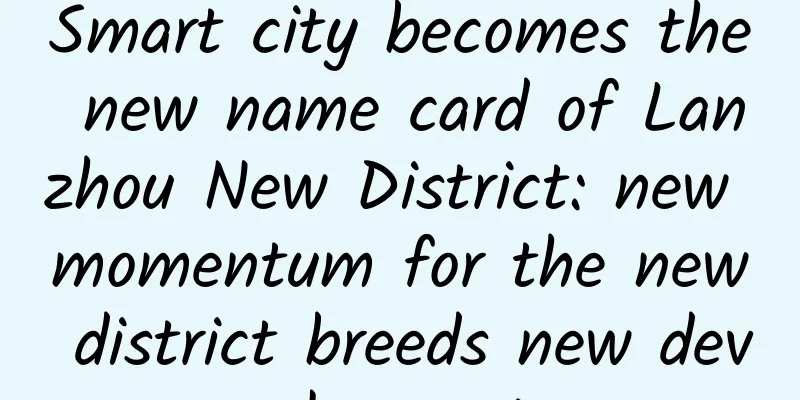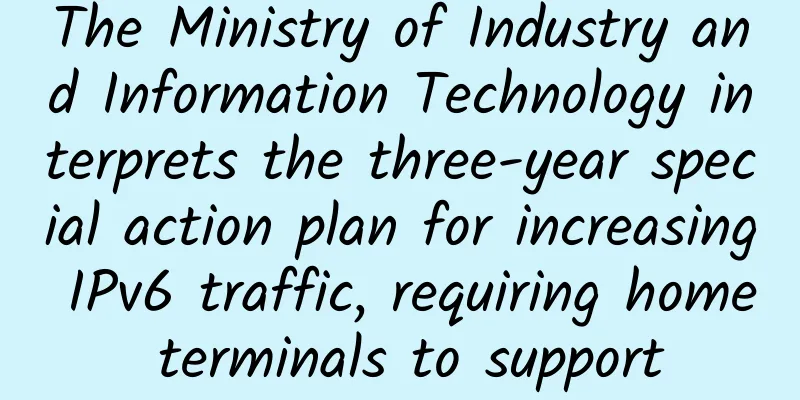Smart city becomes the new name card of Lanzhou New District: new momentum for the new district breeds new development

|
[51CTO.com original article] Not long ago, the 2019 New Smart City (Lanzhou New District) Summit was grandly held in Lanzhou New District. With the theme of "New District, New Driving Force, New Development", the conference attracted more than 700 customers and partners from all over the country to attend the conference to jointly explore new ideas for smart city construction, new driving forces and new practices for urban digital transformation, and accelerate the creation of a new model of digital economic development with smart cities as the main carrier, and realize the transformation of new and old driving forces. Huawei provides strong support to build a new business card for Lanzhou New District
At the conference, Li Dongxin, deputy secretary of the Party Working Committee and director of the Management Committee of Lanzhou New Area, said in his speech that information and communication technologies represented by cloud computing, big data and the Internet of Things are driving the deep integration of the physical world and the digital world. Building a new type of smart city is not only an objective requirement for changing the current urban development mode and improving the quality of economic development, but also an inevitable trend of development in today's era and an important foundation for building a smart society in the future. Under this situation, Lanzhou New Area has given full play to its advantages in climate environment, power resources and policy superposition, listed big data and informatization as strategic emerging industries for key development, actively developed new technology industries such as the Internet of Things and artificial intelligence, and made every effort to create a distinctive smart city, a provincial big data industry cluster, a data resource center in the northwest region and a big data industry demonstration base. He introduced that Lanzhou New Area has introduced 35 big data industry projects, including Huawei Cloud Computing, State Grid Cloud Computing Center, Silk Road Northwest Big Data Industrial Park, etc., with a total investment of 35.3 billion yuan. Since 2017, Lanzhou New Area has carried out in-depth cooperation with Huawei, planning and implementing 22 projects such as basic platform, urban governance, people's livelihood services and smart city operations. Lanzhou New Area is accelerating towards a new smart city with advanced ICT infrastructure, unobstructed information network, convenient production and life, and efficient urban management. It has won the "China Smart City Innovation Award in 2017 and 2018" and the "Top Ten Specially Recommended Destinations for Smart Cities in 2018" award. Big data and smart cities have become Lanzhou New Area's shining business card to the whole country. Huawei's three "new" thoughts on building a new type of smart city
Lu Yong, senior vice president of Huawei and president of China, said in his speech that Huawei has three "new" thoughts on the construction of new smart cities, namely new architecture, new experience and new model. New architecture: Architecture is the foundation of the entire smart city. Only through the aggregation of platforms can smart cities become boosters and promoters of new industries. Traditional smart city construction is a "chimney-style" architecture driven by projects to solve single problems. Data is not connected, which makes it difficult to carry out work in the data governance process. Huawei believes that new smart cities must build a cloud-based open platform and become a "black soil", that is, the concept of a connected data lake to give birth to any "new crops" required for economic development and transformation. "Based on its own digital transformation practices and open capability platforms, Huawei opens up information and services such as big data, artificial intelligence, and geographic location. On the one hand, it supports a variety of smart city applications, such as smart agriculture, medical care, education, etc. On the other hand, it can attract more companies to participate in the construction of smart cities and encourage everyone to use the open "black soil" platform to enable data to continuously create new value." It is understood that based on Huawei technology, a powerful digital platform has been built. Lanzhou New District Smart City construction has completed 9 projects and launched smart services. Nearly 20 projects are underway. In the future, Lanzhou New District's smart city will continue to develop and continuously bring new value to the prosperity of the digital economy. New experience: Lu Yong believes that the "nerve center" of smart cities breaks the previous "chimney-style" architecture and the status quo of business fragmentation. Through data sharing and analysis, data silos can be connected to achieve a good experience for the people, enterprises and the government, and support good government decision-making. In terms of urban governance, Huawei uses artificial intelligence technologies such as voice recognition and video analysis, as well as 5G high-bandwidth and low-latency transmission technology to proactively discover and aggregate multiple urban events, and handle them in a timely manner through integrated video conferencing and communication methods such as video and text messages, achieving efficient linkage command and shortening the time for urban event processing by 25%. New model: In Lu Yong's view, the construction of a new smart city is a long-term and complex project, which requires the participation of various resources in society. The continuous operation and sustainable development of smart cities require innovative practices in business models. At present, most of the construction of smart cities is based on government investment. With the introduction of smart city construction, the interconnection of all things and the collection of massive data, the value of data will be further highlighted, and new business models will inevitably emerge. Smart cities will also change from an investment-driven construction model to an operation-value-added construction model, creating new business value through operation and achieving a virtuous cycle. For example, reducing the vacancy rate of urban parking spaces through operation can not only solve the problems that the people are concerned about, but also bring huge economic benefits. The process from a closed loop of technology to a closed loop of business is also a rule in new smart cities. He said that after two years of construction, the smart city of Lanzhou New District has achieved initial results. So far, the construction of basic platforms such as the city digital platform, government cloud data center and smart brain has been completed. Based on the open capabilities of the city digital platform under the "new architecture" and combined with the actual business needs of the new district, the ecological partners have built and are building a number of business applications such as smart government affairs, smart emergency response, smart grid, smart medical care, and smart logistics to further improve the level of urban management and services, enhance the sense of gain of the people, and promote industrial development. Taking smart government affairs as an example, Lanzhou New District has built the "nerve center" of a new type of smart city. The approval time for enterprise investment projects has been shortened from 137 working days to 30 working days, and the approval time for commitment-based projects has been shortened from 45 working days to 26 working days. The establishment of an enterprise can be completed within one working day, thereby enhancing people's sense of gain and promoting industrial development. "Huawei and Lanzhou New District have deployed the 'black soil' for developing the digital economy in the new district in line with the cooperation concept of 'steady progress and partnership'. We will continue to build the fertility of the black soil and continue to allow the 'black soil' to grow more crops," Lu Yong concluded. Coordination, integration and innovation are the three key words to create a smarter Lanzhou New District
In addition to development strategies and thinking, Huawei also shared more application practices of emerging technologies for urban digitalization. Yao Jiankui, Chief Engineer of Smart City, Huawei Enterprise Business China, gave a speech and business demonstration on the new momentum of the new district and the breeding of new development, which attracted great attention from the participants. Yao Jiankui summarized the three key words for the construction of Lanzhou New District Smart City: coordination, integration, and innovation. In summary, Huawei has achieved integration on the basis of coordinating the information resource system of Lanzhou New District, and at the same time integrated new 5G, artificial intelligence, and big data technologies into some specific business scenarios, making the construction of Lanzhou New District Smart City a sustainable, iterative, and evolvable technology system. He listed several detailed application scenarios: Environmental protection: Lanzhou New District has set up a network to unify all grid workers into one system, and the technology coordinates the reporting information of each grid worker to help environmental protection managers obtain environmental protection data more conveniently and on a larger scale. For example, when joint law enforcement is required for monitoring data of some key enterprises, the IOC fusion command center can quickly launch plans for joint law enforcement, truly realizing the upgrade of environmental protection business. Security monitoring: The high-altitude surveillance camera equipped with Huawei's artificial intelligence chip can cruise 24 hours a day and automatically rotate in the pan-tilt position. Based on artificial intelligence's recognition of people, vehicles and behaviors, for example, when robberies, traffic accidents and natural disasters occur, the camera can automatically sense them. On the one hand, it generates early warning information and transmits it to relevant functional departments to initiate relevant plans for rapid disposal. On the other hand, it can quickly zoom in and record the scene to help quickly collect evidence. Although it is three or four kilometers away in the air, it can zoom in and clearly collect evidence of the scene, greatly improving the ability of public security. Smart Court: The New District Court is problem-oriented and has built a complete system of online intelligent office and case handling, intelligent management, litigation service center, litigation service network, and mobile office and case handling. It can realize online business of all businesses, full process disclosure in accordance with the law, and all-round intelligent services. A networked, transparent and intelligent smart court has basically been formed. Smart Transportation: By deploying Huawei's "Atlas Cloud Platform Server", the level of processing traffic checkpoints has reached 30 times that of the industry. One camera can capture four vehicle heads and 200 faces or license plates at the same time. Vehicle violations on the highway exceeding 200 km/h can be captured and automatically generate tickets, which has a very strong deterrent effect on illegal driving behavior. In addition, at the intersection, the traffic light timing can be adjusted according to the congestion and flow in different directions of the road conditions, so that "in the past, the car looked at the lights and counted down to pass, but now the lights look at the car and read the number of cars to release." Smart healthcare: Yao Jiankui gave a real example on the spot. Half a month ago, an elderly person in the new district had a routine physical examination through a remote ECG monitoring system, and the data was uploaded to the personal health management platform. As a result, the one-to-one service doctor was shocked when he saw the data because the situation was very dangerous. As the technical resources and testing equipment of the new district could not make a judgment, the doctor immediately initiated a consultation with the Beijing China-Japan Friendship Hospital. The professor of the China-Japan Friendship Hospital judged that the elderly person was likely to have a myocardial infarction based on the data and asked the patient, so he was immediately hospitalized, so that the elderly person's condition was discovered and treated in real time. "The core highlight of Huawei in Lanzhou New Area is the digital platform. Based on a unified IT architecture, it realizes the orderly integration of common technical capabilities, brings about the improvement of urban innovation and value, can activate the city's digital assets, reduce the difficulty of mastering new technologies, and release the innovative vitality of society. Ultimately, it will cultivate new momentum and foster new development for Lanzhou New Area." said Yao Jiankui. With the deep integration of urbanization and informatization, smart cities have become a new trend in the development of society. As a pioneer in reform and innovation in Gansu Province, Lanzhou New District has conducted many beneficial explorations in the construction of smart cities, providing valuable experience for the comprehensive promotion of smart city construction. With Huawei's strong support, the two sides will surely complement each other's strengths, jointly promote the construction of a series of typical demonstration applications, focus on driving the development of a number of advantageous industries, and jointly create a national new smart city benchmark. [51CTO original article, please indicate the original author and source as 51CTO.com when reprinting on partner sites] |
<<: China Mobile: Ready for 5G commercial use, new packages to be released in October
Recommend
After working for more than 6 years, I still don’t understand the principles and techniques of coroutines
[[432311]] Preface Hello, my friends! Dabai has w...
Various technical measures to eliminate data center hot spots
According to a study by the Uptime Institute, up ...
Who will pay for the 5G spectrum worth hundreds of billions of dollars?
[[384899]] This article is reprinted from the WeC...
【Funny story】An attack launched by a network cable
Not long after I entered college, I encountered a...
Data center "cloudification" solves the embarrassment of virtualization
Virtualization technology is being used more and ...
RackNerd: $17.88/year KVM-1.5GB/25GB/3TB/Los Angeles, Seattle, San Jose and other data centers
RackNerd is a foreign hosting company founded in ...
Five signs SCVMM isn't right for your data center
Today, System Center Virtual Machine Manager (SCV...
How to stress test network traffic?
There are many network testing software. Today, w...
5G connectivity enables smart substations
[[423089]] Smart substations will be installed be...
Why don't we use HTTP directly for calls between services but use RPC?
[[313073]] What is RPC? RPC (Remote Procedure Cal...
Stop shouting slogans, how to implement IPv6? Operators give details
IPv6, which is "not fast enough to keep up w...
How to understand the differences and connections between Session, Cookie, and Token
This article will introduce Session, Cookie, and ...
By 2026, the Wi-Fi 6 and 6E market in Asia Pacific will reach US$8.559 billion
On March 26, according to foreign media reports, ...
China's 6G network will be commercially available in 2030 to help realize the "intelligent connection of all things"
On June 6, the IMT-2030 (6G) Promotion Group offi...









